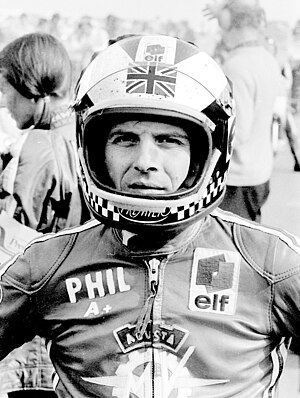Phil Read
Error creating thumbnail: File missing
| |
| Phil Read | |
|---|---|
| Nationality | |
| Years | 1961 - 1976 |
| Teams | Yamaha, MV Agusta |
| Races | 113 |
| Championships | 125cc - 1968 250cc - 1964,1965,1968,1971 500cc- 1973, 1974 |
| Wins | 52 |
| Podiums | 121 |
| Points | |
| Poles | 5 |
| Fastest laps | 1 |
| First race | 1961 350cc Isle of Man TT |
| First win | 1961 350cc Isle of Man TT |
| Last win | 1975 500cc Czechoslovakian Grand Prix |
| Last race | 1976 500cc Nations Grand Prix |
| Phil Read | |
|---|---|
| Nicknames | Readie, The Prince Of Speed |
| Nationality | |
| TTs Contested | 14 (1961 - 1973, 1977) |
| TT wins | 8 |
| First TT win | 1961 Junior TT |
| Last TT win | 1977 Senior TT |
| Podiums | 13 |
Phillip William Read (born 1 January 1939 in Luton, England) is an English former Grand Prix motorcycle road racer nicknamed "The Prince of Speed." Although he would often be overshadowed by his contemporary, Mike Hailwood, he would become the first man to win world championships in the 125cc, 250cc and 500cc classes.
Biography
In 1964, he gave Yamaha their first world title when he won the 250cc class. He would repeat as champion the following year. For 1966, Yamaha would introduce a new, four cylinder 250cc bike. Teething problems with the new engine meant he would lose the crown to Hailwood. In 1967 he would battle Hailwood on his six-cylinder Honda all the way to the final round. They would end up tied but, Hailwood took the crown due to having five wins to Read's four.
The 1968 season proved to be controversial for Read. The Yamaha factory had wanted Read to concentrate on winning the 125cc title and team-mate Bill Ivy to take the 250cc crown. After winning the 125cc championship, Read decided to disobey team orders and fight Ivy for the 250cc title. They finished the season tied in the points and Read was awarded the championship based on elapsed times. It was a costly decision as Yamaha would never offer him another ride.
After sitting out most of the 1969 and 1970 seasons when the major Japanese factories all withdrew from Grand Prix racing, he returned in 1971 on an Eric Cheney modified privateer Yamaha with no factory support. On this bike he was able to claim his fifth world championship.
In 1972 he was given a ride with the MV Agusta team and in 1973, he took the 500cc world championship. He successfully defended his crown in 1974 in what would be the last world championship for the legendary Italian marque. It would also be the last time a four-stroke machine would win a title until the advent of the MotoGP class in 2002.
He would give Agostini's Yamaha a strong fight for the 1975 500cc championship but finished in second place. Realizing the writing was on the wall for four-stroke machinery, he left the Italian company to campaign a privateer Suzuki in the 1976 season after which, he retired from Grand Prix racing. His last race was at the Isle of Man TT in 1982 at the age of 43. The FIM named him a Grand Prix "Legend" in 2002.
A less well-known aspect of Read's career was his involvement in endurance racing. He rode a Honda in the 24-hour Bol d'Or endurance race at Le Mans; and he was involved in the 8-hour race at Thruxton.
Motorcycle Grand Prix results
| Year | Class | Classification | Machine | Victories |
|---|---|---|---|---|
| 1963 | 250cc | 10th | Yamaha | 0 |
| 1964 | 125cc | 8th | Yamaha | 0 |
| 1964 | 250cc | 1st | Yamaha | 5 |
| 1964 | 350cc | 6th | AJS | 0 |
| 1965 | 125cc | 10th | Yamaha | 1 |
| 1965 | 250cc | 1st | Yamaha | 7 |
| 1965 | 350cc | 9th | Yamaha | 0 |
| 1966 | 125cc | 4th | Yamaha | 1 |
| 1966 | 250cc | 2nd | Yamaha | 0 |
| 1966 | 350cc | 8th | Yamaha | 1 |
| 1967 | 125cc | 2nd | Yamaha | 2 |
| 1967 | 250cc | 2nd | Yamaha | 4 |
| 1968 | 125cc | 1st | Yamaha | 6 |
| 1968 | 250cc | 1st | Yamaha | 5 |
| 1969 | 250cc | 13th | Yamaha | 1 |
| 1969 | 350cc | 13th | Yamaha | 1 |
| 1971 | 250cc | 1st | Yamaha | 3 |
| 1972 | 250cc | 4th | Yamaha | 2 |
| 1972 | 350cc | 5th | MV Agusta | 1 |
| 1973 | 350cc | 3rd | MV Agusta | 0 |
| 1973 | 500cc | 1st | MV Agusta | 4 |
| 1974 | 500cc | 1st | MV Agusta | 4 |
| 1975 | 500cc | 2nd | MV Agusta | 2 |
| 1976 | 500cc | 10th | Suzuki | 0 |
